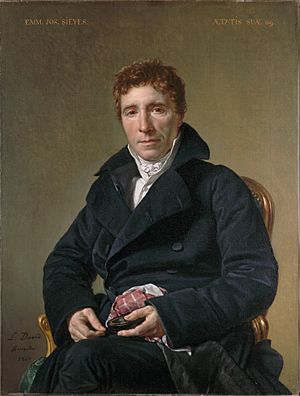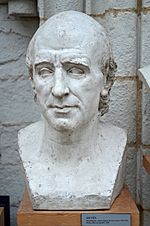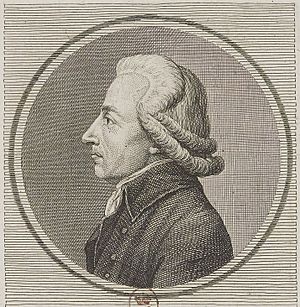Emmanuel Joseph Sieyès facts for kids
Quick facts for kids
Emmanuel Joseph Sieyès
LH, OR
|
|
|---|---|

Abbé Sieyès, by Jacques-Louis David (1817, Fogg Museum)
|
|
| President of the Conservative Senate | |
| In office 27 December 1799 – 13 February 1800 |
|
| President | Napoleon Bonaparte |
| Succeeded by | François Barthélemy |
| Provisional Consul of France | |
| In office 10 November 1799 – 12 December 1799 Serving with Napoléon Bonaparte and Roger Ducos
|
|
| Preceded by | Office created |
| Succeeded by | Jean-Jacques-Régis de Cambacérès (as Second Consul) |
| Member of the Directory | |
| In office 17 June 1799 – 10 November 1799 |
|
| Preceded by | Jean-François Rewbell |
| President of the Council of Five Hundred | |
| In office 21 November 1797 – 20 December 1797 |
|
| Preceded by | François-Toussaint Villers |
| Succeeded by | Antoine Boulay de la Meurthe |
| President of the National Convention | |
| In office 20 April 1795 – 5 May 1795 |
|
| Preceded by | François Antoine de Boissy d'Anglas |
| Succeeded by | Théodore Vernier |
| Member of the National Convention | |
| In office 20 September 1792 – 2 November 1795 |
|
| Constituency | Var |
| Member of the Estates General for the Third Estate | |
| In office 5 May 1789 – 9 July 1789 |
|
| Constituency | Var |
| Personal details | |
| Born | 3 May 1748 Fréjus, France |
| Died | 20 June 1836 (aged 88) Paris, France |
| Resting place | Père Lachaise Cemetery |
| Political party | The Plain (1791–1795) |
| Education | Saint-Sulpice Seminary |
| Profession | Priest, writer |
| Signature |  |
Emmanuel-Joseph Sieyès (born May 3, 1748 – died June 20, 1836), often called the Abbé Sieyès, was an important French writer and political thinker. He played a key role in the French Revolution (1789–1799). He also held important jobs in the French government after the Revolution, including working with Napoleon Bonaparte.
Sieyès is famous for his pamphlet called What Is the Third Estate? (1789). This writing helped start the Revolution by changing how people thought about government. He also helped turn the old French assembly, the Estates-General, into the National Assembly. Later, he was part of the group that helped Napoleon take power in 1799. Sieyès even created the word "sociology" for the study of society!
Contents
Early Life and Education
Emmanuel-Joseph Sieyès was born in Fréjus, a town in southern France, on May 3, 1748. He was the fifth child in his family. His father was a tax collector, and his family was considered commoners, not nobles.
Sieyès first learned from tutors and Jesuits. He later went to a school in Draguignan. He wanted to be a soldier, but he wasn't strong enough. Because of his health and his parents' wishes, he decided to study for a religious career.
He spent ten years studying at the Saint-Sulpice seminary in Paris. There, he learned about theology and engineering to become a priest. He was known for being good at science and for liking "new philosophic principles" more than traditional religious studies.
Sieyès also studied at the Sorbonne. He was very interested in the ideas of thinkers like John Locke, David Hume, Voltaire, and Rousseau. These thinkers were part of the Age of Enlightenment, which focused on reason and individual rights. He got his first theology degree in 1770, but he wasn't very interested in religious studies. In 1772, he became a priest.
Religious Career and Early Views

Even though Sieyès was a priest, he had doubts about religion. He became a priest in 1773 but didn't get a job right away. He spent time studying philosophy and music. In 1774, he was promised a church position in Brittany.
In 1775, Sieyès got his first real job as a secretary to the bishop of Tréguier. He worked there for two years. During this time, he saw how much power the privileged classes had, and he didn't like it. In 1780, he moved with the bishop to Chartres and became a high-ranking church official there.
Sieyès noticed that nobles easily got important church jobs, while commoners struggled. He felt that the special treatment given to nobles in the Church was unfair. He believed it was humiliating for commoners.
It's thought that Sieyès chose a religious career not because he was very religious, but because it was a way for him to become a political writer and make a difference.
What Is the Third Estate?
In 1788, King Louis XVI of France decided to call a meeting of the Estates-General for the first time in over 150 years. This meeting was meant to discuss France's problems. A government official, Jacques Necker, asked French writers to share their ideas about how society should be organized.
This led Sieyès to publish his famous pamphlet in January 1789, called Qu'est-ce que le tiers-état? (What Is the Third Estate?). The pamphlet was a huge success. Even though Sieyès was a clergyman (part of the First Estate), he was chosen as a representative for the Third Estate from Paris.
He played a major role in the early years of the Revolution. He helped write the Declaration of the Rights of Man and of the Citizen. This document talked about ideas like national sovereignty (the idea that the nation has supreme power) and popular sovereignty (the idea that the people have supreme power).
Sieyès's pamphlet caused a strong reaction. In it, he said that the Third Estate wanted to be "something" important. But because the privileged classes existed, the Third Estate was forced to be "the least thing possible." This powerful language helped unite common people. It made them realize that France's problems were not just about the king's power. It was also about unfair privileges that divided the nation. This was a big step towards the Revolution's fight for equal rights.
Impact on the Revolution
Sieyès's pamphlet was very important in shaping the ideas that led to the French Revolution. He explained the hopes and frustrations of the Third Estate, which included most of the French people. He argued that the nobility was a false system that took advantage of the common people.
The pamphlet said that the Third Estate, made up of productive workers, truly represented the nation. This included farmers, craftspeople, merchants, lawyers, and others who created goods and services for society. Sieyès challenged the old social order by saying that the nobles, who didn't contribute to production, were like a foreign group within France. He called their special privileges "treason to the commonwealth."
Sieyès's pamphlet greatly influenced the discussions before the Estates-General meeting. The Third Estate demanded that they have as many representatives as the other two privileged groups combined. More importantly, they wanted votes to be counted "by heads" (one person, one vote) instead of "by orders" (each of the three estates getting one vote).
The pamphlet brought these issues to the public. Sieyès encouraged the Third Estate to unite against the old system. He suggested that members of the First and Second Estates should join the Third Estate to form one united body representing the entire nation. He even said that if they refused, they would be failing their national duty.
On June 5, 1789, the Third Estate adopted this idea. They declared themselves the National Assembly, taking the authority to represent the nation. Sieyès convinced them to use this name and was elected to the Assembly's committee that would write a new constitution.
As part of the constitutional committee, Sieyès argued that the Assembly should not need the king's approval for constitutional matters. He wanted equal voting power, a single legislative body, and no royal veto over laws. Sieyès believed the National Assembly had complete power as the true representative of the nation. He thought representatives should be free from influence from both the king and the people once elected. In September 1789, the Assembly voted for a single legislative body, showing Sieyès's influence.
Political Roles and the Terror
Sieyès was not a great public speaker, but he had a lot of political influence. He supported the Estates reuniting as the National Assembly. However, he disagreed with ending tithes (church taxes) and taking away church lands. This disagreement made him less popular in the National Assembly.
He was part of the committee that wrote the constitution. He was against the king having an "absolute veto" (the power to completely block laws). After 1790, other politicians became more prominent.
Sieyès returned to politics in the third national assembly, called the National Convention (1792–1795). He voted for the death of King Louis XVI. During the dangerous time of the Reign of Terror, when many people were executed, Sieyès was asked what he did. He famously replied, "J'ai vécu" ("I lived"), meaning he simply survived.
Sieyès had hoped for a peaceful revolution that would create a constitutional monarchy. He wanted a constitution that would guarantee rights and equality for all French men. However, the Revolution took a more extreme path than he intended.
The Directory and Napoleon
After the execution of Robespierre in 1794, Sieyès became an important political figure again. In 1795, he went on a diplomatic mission to The Hague and helped create a treaty between France and the Batavian Republic. He didn't like the new constitution created by the Directory and refused to serve as a Director at first.
In May 1798, he went to Berlin to try to get Prussia to join France against its enemies, but this failed. Still, his reputation grew, and he became a Director of France in May 1799.
Sieyès then started looking for ways to overthrow the Directory. He even considered replacing the government with other rulers. He tried to weaken the constitution and closed the Jacobin Club. He also tried to plan a coup d'état (a sudden takeover of the government) with General Joubert.
When Joubert died in battle and Napoleon Bonaparte returned from his campaign in Egypt, Sieyès found a new partner. In the coup of 18 Brumaire, Sieyès and his allies dissolved the Directory, which allowed Napoleon to take power. Sieyès then created a new constitution, but Napoleon changed it completely. Napoleon's constitution became the basis for the French Consulate (1799–1804).
Bonaparte, Sieyès, and Roger Ducos were appointed as "Consuls of the French Republic." They swore to be loyal to the people and the Republic. Sieyès had many ideas for the new government, but Napoleon and Roger-Ducos didn't agree with all of them.
Sieyès wanted a system where citizens would choose lists of people for local, departmental, and national offices. The highest officials would be chosen from the national list. He also imagined a Tribunat to discuss laws and a College des Conservateurs to protect the constitution. The College could even take in anyone dangerous to the state, removing them from other offices. Sieyès's main idea was to divide power to prevent any one person or group from becoming too strong.
Later Life and Legacy
Sieyès soon left his job as provisional Consul. He became one of the first members of the Sénat conservateur (Conservative Senate) and was its president in 1799. Napoleon gave him a large estate. After a plot against Napoleon in 1800, Sieyès supported Napoleon's actions to remove leading Jacobins.
During the time of the First French Empire (1804–1814), Sieyès mostly stayed out of public life. When Napoleon briefly returned to power in 1815, Sieyès was named to the Chamber of Peers.
After the Second Restoration in 1816, Sieyès was removed from the Academy of Moral and Political Sciences because of his role in King Louis XVI's execution. He moved to Brussels but returned to France after the July Revolution of 1830. He passed away in Paris in 1836 at the age of 88.
Contribution to Social Sciences
In 1795, Sieyès became one of the first members of what would become the Academy of Moral and Political Sciences in France. When the Académie Française was reorganized in 1803, he was elected to a special chair.
In 1780, Sieyès actually created the word sociologie in a manuscript that was not published at the time. Fifty years later, the philosopher Auguste Comte used the term again to describe the scientific study of society, which we now call sociology.
Personal Life
Sieyès was known for being very intellectual and smart. His ideas and beliefs developed from his own experiences. From a young age, he disliked the special privileges given to nobles. He felt this was unfair to common people. He saw this unfairness clearly when he observed the nobility's power in the Estates of Brittany.
Besides his political ideas, Sieyès also loved music. He spent a lot of his free time enjoying and writing about music. He even had a collection of musical pieces he called "la catalogue de ma petite musique" (my little music catalog).
Even though Sieyès was passionate about his ideas, he didn't have a very active social life. His writings focused on his studies and rarely mentioned his personal life. People who knew him sometimes described him as cold. Charles Maurice de Talleyrand-Périgord, another important figure, once said that Sieyès saw people as "chess-pieces to be moved," meaning he thought about them logically but didn't connect with them emotionally.
See also
 In Spanish: Emmanuel-Joseph Sieyès para niños
In Spanish: Emmanuel-Joseph Sieyès para niños
- What Is the Third Estate?, a political pamphlet written by Sieyès
- Les Neuf Sœurs, a Parisian Masonic lodge of which Sieyès was a member
Images for kids
 | Selma Burke |
 | Pauline Powell Burns |
 | Frederick J. Brown |
 | Robert Blackburn |



